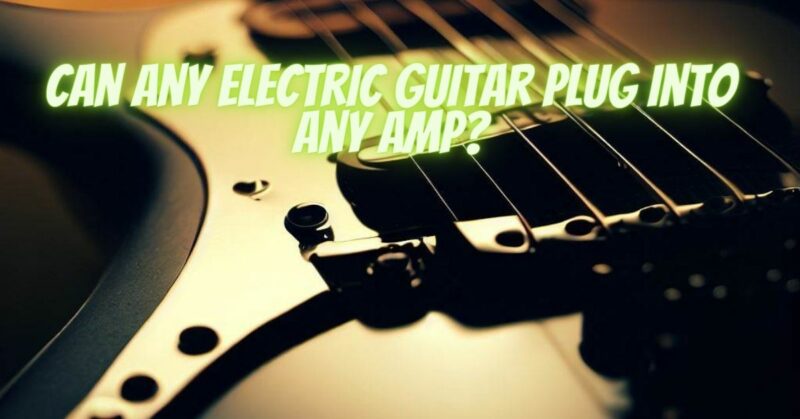Electric guitars and amplifiers are essential components of a guitarist’s setup. While it’s generally true that most electric guitars can be plugged into most amplifiers, there are certain compatibility factors and considerations to keep in mind. In this article, we’ll explore the compatibility between electric guitars and amplifiers and highlight some key points to ensure a successful connection.
Basic Compatibility:
In a broad sense, yes, most electric guitars can be plugged into most amplifiers. This is because the fundamental signal flow and connectors are standardized in the music industry. Most electric guitars use a 1/4-inch (6.35mm) output jack, and most amplifiers have a corresponding input jack labeled “Input” or “Guitar In.”
Matching Impedance:
One of the most important factors to consider is impedance matching. Impedance refers to the electrical resistance that a device presents to the signal passing through it. Amplifiers and speakers are designed to work with specific impedance ratings, usually expressed in ohms (Ω).
Amplifier Impedance: Amplifiers typically have an output impedance rating, which specifies the impedance of the speakers they are designed to drive. For example, an amplifier might be labeled as “8Ω” or “16Ω.”
Speaker Impedance: The speakers you connect to the amplifier also have impedance ratings. These ratings should match or be compatible with the amplifier’s output impedance. Mismatched impedance can affect the overall tone and even damage the amplifier or speakers over time.
Guitar Compatibility:
Electric guitars themselves generally don’t have impedance ratings that you need to worry about. However, the type of pickups and controls on your guitar can influence the sound when plugged into different amplifiers.
Types of Guitars and Amplifiers:
Different types of guitars and amplifiers can yield varying results due to their inherent characteristics:
- Single-Coil vs. Humbucker Pickups: Guitars equipped with single-coil pickups might produce more noise (hum) when plugged into high-gain amplifiers. Humbucker-equipped guitars are generally quieter in high-gain situations.
- Guitar Type: The type of guitar (Stratocaster, Les Paul, Telecaster, etc.) can influence the overall tonal response when connected to different amplifiers. Some guitars are associated with certain genres and amplifier types.
- Amplifier Type: The amplifier’s design (tube, solid-state, modeling) and its tonal characteristics play a significant role in shaping the sound of your guitar. A vintage tube amp might emphasize warmth, while a solid-state amp might offer cleaner tones.
Effects and Pedals:
Keep in mind that effects pedals can also impact the overall compatibility between your guitar and amp. Distortion, overdrive, and other effects can interact differently with various types of amplifiers, affecting the final sound.
Experimentation and Personal Preference:
While there are guidelines to consider, it’s important to remember that music is a creative endeavor. Experimentation is key to discovering unique sounds that suit your style and preferences. Try different guitars with different amplifiers, and don’t hesitate to test various settings and effects to find your signature sound.
In general, most electric guitars can be plugged into most amplifiers, but impedance matching and tonal considerations are crucial factors. Understanding the compatibility between your guitar and amplifier will help you achieve the best possible sound and avoid potential technical issues. Remember that music is a combination of science and art, so don’t be afraid to experiment and explore new sonic territories to find the perfect match for your musical expression.


